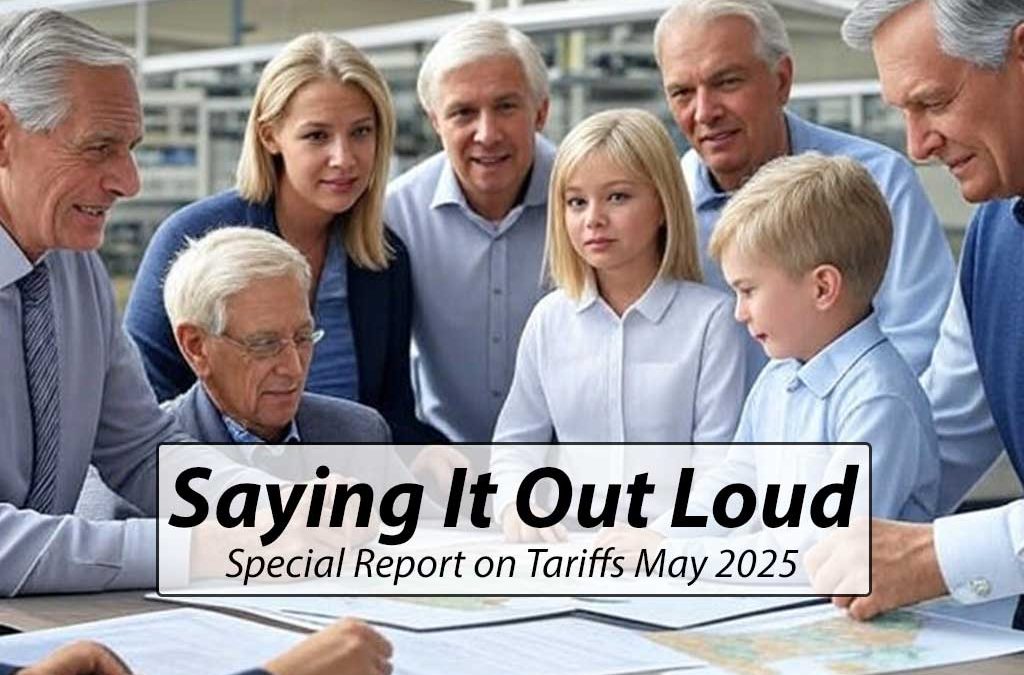Tell Us What Matters Most to Your Family-Owned Business
Family-Owned Businesses Feel the Impact of New Tariffs, ‘Weight of Uncertainty’
Family-owned businesses across America are keeping their fingers crossed they will survive the cost and uncertainty of the Trump Administration’s global trade agenda.
If you follow reports from economists, the media, politicians, and leaders of family-owned businesses, which make up nearly 60% of the private workforce in America, there are a lot of contrasting views on the impact of tariffs – and they’re changing by the minute.
While the White House highlights support for tariffs among American manufacturers, who laud the long-term efforts to increase domestic manufacturing, which currently makes up 10% of U.S. GDP, they contrast sharply with concerns from economists and family business owners that the impact of tariffs on imported goods, particularly those on goods from China, Mexico, and Canada, will lead to higher prices for consumers and threaten the livelihoods of their generationally-owned family businesses.
On the bright side, one recent trade deal outlined with the United Kingdom shows progress is being made in hammering out deals. This leaves 179 international trade deals to be finalized.
The greatest “invisible tax,” many say, is the uncertainty of it all.
The Federal Reserve Board Chairman, Jerome Powell, recently added to this notion in the Fed’s latest statement: “Uncertainty about the economic outlook has increased further. The Committee is attentive to the risks to both sides of its dual mandate and judges that the risks of higher unemployment and higher inflation have risen.”
The “uncertainty tax” is a major impediment right now for family-owned business planning and investment.
“I’ve got whiplash from all of this,” said Mark Zandi, Chief Economist at Moody’s Analytics in a recent newscast. “It can’t be good for businesses trying to make investment decisions,” he said. “The uncertainty is a heavy weight on the economy.”
Ryan Sweet, Chief U.S. Economist, Oxford Economics, said, “The Trump Administration inherited an economy that was firing on most, but not all, cylinders.” In any given year, he added, “the probability of a recession is around fifteen percent. Now, it’s essentially a flip of the coin whether we have a recession this year.”
Other financial experts weigh in with parallel, or vastly different, views.
Stephen Moore, former Trump economic advisor and publisher of the Unleash Prosperity financial newsletter, says if the Trump dealmakers “can get deals done we could have a boom” in the U.S. economy. But Moore also adds the near term “could be difficult.”
JPMorgan Chase Chief Executive Officer, Jamie Dimon, said in a recent Fox news report it’s important the White House “shows progress on deals, and now is the time to make progress.”
Dimon, like Moore, agreed it is likely “in the short-term there could be more inflation, higher prices,” and perhaps “a short-term recession” due to the uncertainty.
What Family-owned Businesses Say
If you speak with family-owned businesses leaders there is a mix of feelings that depend on the industry.
“The tariffs have adversely impacted our business unlike any other event in our company’s history,” says Southern California-based Eno Brands Chief Strategy Officer, Kevin Tsao. Eno Brands is a fashion jewelry manufacturer, working with partner manufacturers in China on such brand names as Kate Spade and Tory Burch.
“The pace at which it was announced and rolled out did not allow any time for proper planning or mitigation efforts,” said Tsao. “It has completely upended our industry.”
For Eno Brands, the tariffs and lack of guidance on timing from the White House makes “planning virtually impossible,” according to Tsao.
“While I understand the theory behind tariffs, the roll-out and uniformity across industries do not make sense,” he says. “A desire to bring more on-shoring makes sense in specific industries in which automation, technology and budget are available, this makes sense, but to do so across the board in industries where U.S. workers do not want to work is illogical at best.”
Tsao is not alone in his thinking.
In a recent poll by Family Enterprise USA, some 60 family-owned businesses leaders weighed in on the Trump Administration tariff plan.
When asked if “They are affected by tariffs?” some 54% of family-owned business leaders said “Yes,” they were affected. On the other hand, 46% said “No.”
When asked a follow up question: “Are you concerned about tariffs affecting business?” the results were more dramatic.
Over 64% said “Yes,” they were concerned about tariffs, while 36% said “No,” they were not.
“(It’s) hard to plan right now, we’re stocking up critical items, and building up raw inventory,” said Marc Goodhart, President of Fabrication, of family-owned Goodhart & Sons, Inc., Lancaster, Pa. Goodhart is a fourth-generation family-owned company steel fabricator serving power generation, alternative energy, and pollution control markets.
“Ironically, customer demand has been strong, but we’re anticipating a softening,” Goodhart says. “In short, planning beyond a year feels futile, preparation to adapt is our main focus.”
Goodhart, like many, believes addressing unfair trade with China was long overdue, and he is “glad to see it happen.” However, he believes, that if the tariffs remain, and prices remain high, he is “not sure this will be as fruitful for U.S. manufacturing as promised.”
Goodhart believes supply chain restructuring will take far longer than people anticipate.
“If we have another policy change three years from now, we’ll again be faced with more volatility,” he says. “I do, however, appreciate the administration’s intentions.”
While many family businesses are looking for alternate sources of materials and production, and for new markets, these strategies are time-consuming, costly, and often not feasible as high tariffs are now placed on all countries.
Big Tariff Targets
China, of course, is the biggest target in the tariff battle.
Discussions are underway with the China to manage tariffs, are they were reduced for 90 days from 124.1% to 30%, but this is likely to change yet again as discussions heat up or cool down.
If you are in the U.S. steel or specialty metals business the view on tariffs is often different since this industry has long sought tariff protection from overseas competitors dumping low-cost product in the U.S. market. But even there, the policies feel haphazard and dangerous, some family-owned businesses say.
Sue Totten, Director of Totten Family Office at specialty steel tube manufacturer, TottenTubes, Azusa, Calif., saw steel prices rise immediately from $670 a ton to $950 a ton, a 42% increase.
“Demand was affected as companies panic-purchased to avoid price increases,” Totten says. “Prices go up higher than even the tariff’s twenty-five percent rate, leaving room for imports to come in cheaper, then prices have to go down.”
Totten sees tariffs creating a profitability spike. While this created a great first quarter, she says, “we have concerns about our margins in the second and third quarters.”
In many industries, buyers are hedging their bets by keeping inventories low and planning for a recession, or a variety of economic calamities.
“This was not a factor in 2024,” says Totten. “When we were planning for 2025 the economy was universally lauded as very strong and ‘the envy of the world’.”
“They help protected industries in the short term,” Totten says. “But these tariffs feel haphazard and feel like they are going to have a negative effect on the consumer, which negatively effects the economy and business overall. The tariff approach seems to be without strategy and ham-handed.”
End the Uncertainty
The impact of global trade policy falls squarely on the shoulders of our nation’s largest economic engine: family-owned businesses. It’s up to our elected lawmakers to make sure this burden doesn’t go too far, and the tax of uncertainty dissipates as soon as possible.
Thankfully, the uncertainty presented by the expiration of the Tax Cuts and Jobs Act, particularly the 199A deduction for pass-through businesses, is currently being addressed by Congress and will hopefully be resolved well before the tax cliff at the end of the year.
We hope you’ve enjoyed this article. While you’re here, we have a small favor to ask…
As we prepare for what promises to be a pivotal year for America, we’re asking you to consider becoming a supporter.
The need for fact-based reporting of issues important to family offices and successful families and protecting a lifetime of savings has never been greater. Now more than ever, family offices and successful families are under fire. That’s why Family Enterprise USA Action is passionately working to increase the awareness of issues important to family offices and successful families, while continuing to strengthen our presence on Capitol Hill.
Family Enterprise USA Action engages with legislators on Capitol Hill on behalf of family offices, successful families, and family-owned businesses. It is focused exclusively on the critical tax and economic policies that impact them. Since 1995, FEUSA Action has been the leading advocacy group working daily in Washington, D.C., to reduce and eliminate estate tax, gift tax, and generation skipping transfer tax while blocking increased income and capital gains taxes, the creation of a wealth tax, and other hostile policies that punish hardworking taxpayers and success in the U.S. It is a bipartisan 501.c4 organization.
#incometax #CapitalGainsTax #R&DExpensing #DontPunishSuccess #GrantorTrusts #likeKindExchanges #AcceleratedDepreciation #EstateTax #Deathtax #wealthtax #taxLegislation #incometaxrates #repealestatetax #FamilyOffice #SuccessfulFamilies @PolicyAndTaxationGroup @DitchTheEstateTax #PolicyAndTaxationGroup #DitchTheEstateTax #FamilyEnterpriseUSAAction


